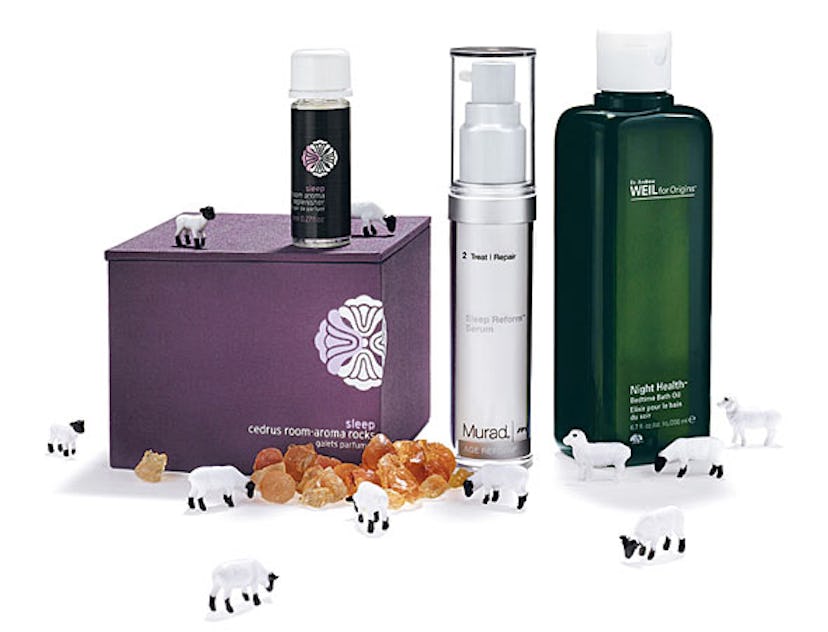Night Shift
As sleep becomes increasingly elusive, beauty companies are offering various forms of lullabies.

Every few years the beauty industry seems to target a new enemy in the war on wrinkles. In the Eighties the hole in the ozone layer was declared a complexion killer, leading to the advent of antioxidant creams. In 2007 sugar was singled out as a skin ager, and a batch of antiglycation serums hit the market. And now, judging from the products landing on cosmetics counters, another offender has been added to the list: sleep deprivation.
According to the National Sleep Foundation, 65 percent of Americans have trouble sleeping, and the problem is only worsening. From 2002 to 2008 the average nightly allotment fell from seven hours to six hours and 40 minutes. The reasons for the drop are manifold: “People today are overscheduled, overmanaged and overcaffeinated,” says Shannon Sullivan, clinical instructor at Stanford University’s Sleep Disorders Clinic. “The more things you try to stuff into your day, the less time you have to relax.”
The consequences of pulling an all-nighter—as any college student can tell you—are not pretty. There’s a reason, after all, why it’s called beauty sleep. But according to dermatologist and skincare entrepreneur Howard Murad, regularly burning the midnight oil causes more than dark circles and bloodshot eyes. “The effects of lack of sleep include dry, sallow skin and fine lines,” he says. “During a body’s nightly sleep cycle, it has a chance to replace damaged cells with strong new ones. Without enough sleep, there are too many weak cells, and this gradual degeneration in function is something we can see.” In addition, he says, skimping on REM elevates cortisol levels, which can inhibit collagen production and accelerate water loss. Poor sleep has also been shown to bring down levels of human growth hormone, thus slowing cell renewal and tissue repair.
To combat these woes, Murad launched two new products in January: Sleep Reform Dietary Supplement, a sleep aid, and Sleep Reform Serum, a light lotion meant to enhance sleep’s beneficial effect on skin. Synthetic melatonin, a version of the hormone the body produces to maintain circadian rhythms, is a key ingredient in both. Popping melatonin pills is nothing new—the capsules have been available in drugstores for years—but Murad is the first big brand to offer a topical product. Applying it, he says, “maximizes the skin’s ability to repair and regenerate” during the sleep cycle. And, he adds, “melatonin is also an unusually powerful antioxidant and anti-inflammatory.”
Ellen Marmur, chief of dermatologic and cosmetic surgery at Mount Sinai Medical Center in New York, concurs that lack of sleep can wreak havoc on one’s complexion. But while some studies have shown melatonin to be an effective antioxidant, Marmur points out that Murad’s claim that topical application aids skin regeneration has not been tested in a peer-reviewed study. “I put this in the category of unproven cosmeceuticals,” she says. “They may or may not work, and we have no sound evidence either way.”
Murad, meanwhile, isn’t the only skincare company attempting to lull its customers into dreamland. Other beauty brands are relying on botanicals rather than hormones to do the trick. The Dr. Andrew Weil for Origins Night Health line, out in February, includes a bath oil, a linen spray, a face cream and a pulse-point balm, all of which contain calming chamomile, lavender and mandarin oils. “The products are not designed to effect a knockout, but to encourage our natural capacity to sleep,” says Rubin Naiman, sleep and dream specialist at Weil’s Arizona Center for Integrative Medicine, who developed the line with Weil. Molton Brown is also going the aromatic route, lacing its new Body Therapies Sleep collection with Bulgarian lavender, sweet Florida orange and Atlas cedar bark. The collection includes Bathing Elixir, Soothing Body Oil and Room-Aroma Rocks (a postmodern take on potpourri meant to be stored bedside).
According to Stanford’s Sullivan, while aromatherapy is unlikely to cure serious insomnia, nightly rituals involving calming potions can promote restful sleep. A fragrant bath, for example, can serve as a “buffer period” between the stresses of the day and bedtime. And while essential oils aren’t likely to replace Ambien, they’re far less fattening than warm milk.